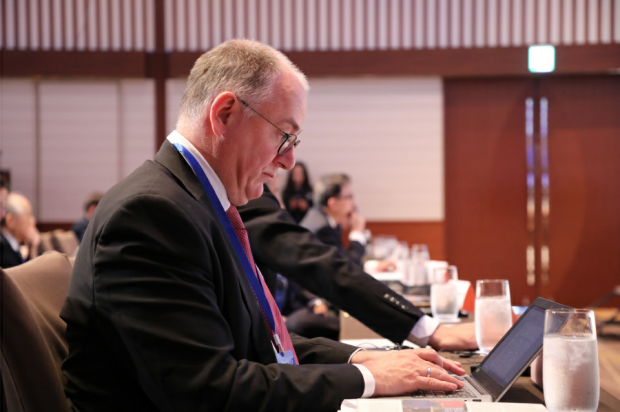G20 upholds spirit of partnership, copes with common challenges

A representative makes note at the International Forum for Open Global Economy. The forum opened on June 25. By Zhao Yipu from People’s Daily
Chinese President Xi Jinping arrived in Osaka, Japan on June 27 for the 14th Group of 20 (G20) summit. It marks the seventh consecutive time for the Chinese President to attend or chair the G20 summit, reflecting the high importance China attaches to G20 cooperation and global economic governance. The G20 was formally established in 1999 when finance ministers and central bank governors met in Washington, D.C. In 2008, the meetings were raised to the level of heads of state and government in the aftermath of the global financial crisis.
A year later, the mechanism was formally recognized as a major platform for international economic cooperation at the G20 Summit in Pittsburg, marking a vital step forward of the global economic governance reform.
Over the past 10 years, major economies of the world reinforced coordination and cooperation, playing a significant role in safeguarding the stability and development of the world economy. As the international situation develops, the focus of each party has turned from short-term economic stability and recovery to mid- and long-term sustained and inclusive development. At present, unilateralism and protectionism are severely impacting global orders and the multilateral trading system, becoming a major threat for the stability of world economy. The world economy has to make a new historic choice. A wise man changes as time and event change. China has become an important participant and navigator of G20.
Every time when President Xi attended or chaired the G20 summit, no matter in St Petersburg, Brisbane, Antalya, Hangzhou, Hamburg or Buenos Aires, he has proposed Chinese schemes and injected Chinese wisdom to the promotion of world economic growth, enhancing international economic cooperation and the improvement of global economic governance. His efforts demonstrated the spirit of cooperation and an open mind of China as a major and responsible country, winning respect and appraisal from the international society. Secretary-General of the United Nations Antonio Guterres told People’s Daily during a previous interview that China is a central pillar of multilateralism and actively participates in global development cooperation. The country is working with the international society to explore a global governance system to tackle global challenges, the secretary-general said.
The proposal to build a community with a shared future for mankind, pioneered by President Xi Jinping, is an important contribution to the world, Guterres said. President Xi has delivered a series of important speeches at the previous G20 summits, including Stressing to Firmly Maintain and Develop an Open World Economy, Promoting Innovative Development Achieving Interconnected Growth, Building an Innovative, Invigorated, Interconnected and Inclusive World Economy, Promoting Openness and Inclusiveness to Achieve Interconnected Growth, and Look Beyond the Horizon and Steer the World Economy in the Right Direction.
When the world is undergoing profound changes unseen in a century, China calls on each country to uphold the spirit of partnership, enhance policy coordination, settle disputes and cope with common challenges. During the G20 Osaka summit, President Xi will attend four plenary sessions, and talk with other leaders about issues such as the global economy and trade, digital economy, inclusive and sustainable development, infrastructure, climate change, energy, and environment. He will elaborate on China’s views about the world economy, seek solutions to current problems, and examine the direction of the global economy. Professor Kerry Brown from King’s College London told People’s Daily that he is expecting President Xi to make Chinese voices at the G20 Osaka summit, and it is believed that his voices will be a common focus of the international society.
By Zhao Jiaming
(People’s Daily)

























































